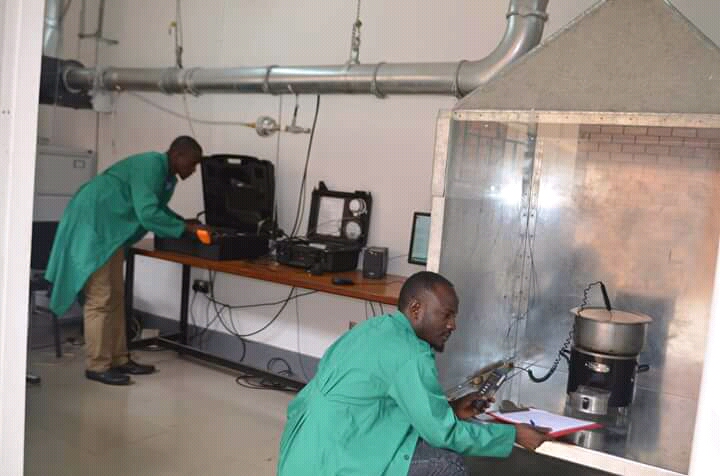ARE YOU A STOVE MANUFACTURER? HERE IS WHY YOU NEED TO TEST YOUR COOKING STOVE.
Technicians at CREEC performing a testing exercise on one of the stoves.
Stove performance varies greatly, and the performance of a specific stove is often different in the laboratory and in the field. Testing allows implementers to learn how well stoves perform and to quantify improvements in fuel efficiency and emissions. Test results can be used to guide implementation decisions and to improve stove design and performance.
The demand for cooking stoves across the globe has been increasing over time. This therefore has prompted different people to resort to manufacturing different kind of stoves with a number of unique features in order to attract a larger population to the product. A number of these cooking stoves range from Solar cooking stoves, wood burning stoves, wood pellet stoves, Biomass stoves, ethanol stoves and many others. Today, we bring you the benefits that come with testing your cooking stove. However good you think something is, it will need testing. In our daily lives, whenever you feel sick, you will have to go for a check up to see what the problem is. The same applies to the stoves, you cannot know what the problem is with your cooking stove without testing it. A number of stove manufacturers do take their stoves to the market without the maximum standards, and this in the long run costs them a lot. Like any other product, cooking stoves have to meet a certain minimum standard before they are put to market.
Testing your cooking stove not only makes you a trustworthy supplier but also has a number of benefits which include, consumer loyalty to your products, great public image, a fair market share, larger profits enjoyed, higher sales made and less interference by the government.
Below are some of the Stove performance testing protocols.
Water Boiling Test.
The Water Boiling Test (WBT) is a laboratory test that evaluates stove performance while completing a standard task (boiling and simmering water) in a controlled environment to investigate the heat transfer and combustion efficiency of the stove. They are the easiest, quickest, and cheapest to conduct, but reveal the technical performance of a stove, not necessarily what it can achieve in real households.
Controlled cooking test.
The Controlled Cooking Test (CCT) is a field test that measures stove performance in comparison to traditional cooking methods when a cook prepares a local meal. The CCT is designed to assess stove performance in a controlled setting using local fuels, pots, and practice. It reveals what is possible in households under ideal conditions but not necessarily what is actually achieved by households during daily use.
Kitchen performance test.
The Kitchen Performance Test (KPT) is a field test used to evaluate stove performance in real-world settings. It is designed to assess actual impacts on household fuel consumption. KPTs are typically conducted in the course of an actual dissemination effort with real populations cooking normally, and give the best indication of real world changes.
The Centre for Research in Energy and Energy Conservation (CREEC) has a laboratory, RTKC (Regional Testing and Knowledge Centre) which offers stove and fuel testing services to stove manufacturers and promoters using globally accepted testing procedures.In Africa, there are currently two of these testing Centres, one is in South Africa and the other is located in Uganda.

